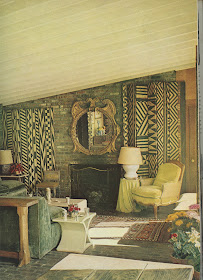RARE vintage is in the house. The house of Horst.
Diana Vreeland, editor-in-chief of Vogue in 1968, said in the introduction to Vogue's Book of Gardens, Houses, People "Few things are more fascinating than the opportunity to see how people live during their private hours - in the rooms they love, the gardens they have planted, among their personal possessions..."
I have been wanting to add a new feature to the RARE vintage blog about home and interior design for quite awhile now and when I saw Horst's house and read about his gardens I knew that this house, not far from my own Centre Island home, was the perfect place to start.
Horst found a piece of land on a part of the former Louis Comfort Tiffany property which had stretched from Cold Spring Harbor to Oyster Bay Cove. He recalled the house "was in a state of premature decay. The panes of his immense glass aviary were broken. A New York art school held a summer course for its students among the cobwebs of his empty garages and stables."
Can you imagine?! There are/were so many of these wonderful old homes on the North Shore of Long Island that were abandoned and left to ruin.
I have been wanting to add a new feature to the RARE vintage blog about home and interior design for quite awhile now and when I saw Horst's house and read about his gardens I knew that this house, not far from my own Centre Island home, was the perfect place to start.
Horst found a piece of land on a part of the former Louis Comfort Tiffany property which had stretched from Cold Spring Harbor to Oyster Bay Cove. He recalled the house "was in a state of premature decay. The panes of his immense glass aviary were broken. A New York art school held a summer course for its students among the cobwebs of his empty garages and stables."
Can you imagine?! There are/were so many of these wonderful old homes on the North Shore of Long Island that were abandoned and left to ruin.
Laurelton Hall. Built by Louis Comfort Tiffany in 1902.
Horst built a low, white, one storied modern house on the North Shore of Long Island in Oyster Bay Cove. It was smaller then he intended because as an European he planned the design of the house in meters as opposed to square feet.
I love the openness of Horst's house and its combination of periods and styles - it looks remarkably modern even though these photographs were taken nearly fifty years ago. The living room has screens of Indonesian batik, a painting by the fashion illustrator Christian Bérard, a small Renoir, a wood refectory style table that Horst had made locally, an Italian baroque mirror and stools by Jean-Michel Frank.
Horst's living room with an Italian mirror - a gift from Chanel.
The interior of the house is very connected to the outdoors. Horst planted five allées of clipped evergreens, a water garden, a cutting garden and park like grounds. There were marble Napoleonic chairs beside a pond, a stone bench near a mossy stream which "added a touch of enchanting, timeless melancholy". Now doesn't that sound beautiful?! Enchanting, timeless, melancholia. I can just imagine strolling the grounds in Vuitton's feathered guipere lace dress with a parasol feeling wistful :)
Horst said that when he lay in bed he felt that he was almost halfway outside in the courtyard surrounded by tulips, begonias, and dwarf dahlias.
Images from Vogue's Book of Houses, Gardens, People. 1966
Vogue wrote that in Horst's gardens "Noel Coward and Christopher Isherwood matched wits for hours, Edith Sitwell met Greta Garbo. Christian Dior shivered in a long ecclesiastical overcoat on a splendid spring afternoon. On a hot August weekend, Truman Capote and his bulldog swam in the stream and Jean Shrimpton walked barefoot under the willows and tulip trees."
A lovely history and house don't you think?
photo from Christies
Photographed at Horst's Oyster Bay house. "This is one of the first photographs that I took at my house in Oyster Bay. The house was not even finished but Alex Liberman thought that, even so, it was a good place for taking photographs. The girls are modeling bathing suits and summer dresses. I always loved sunlight and shadow and straw mats." Horst
Winter fashion photographed in Oyster Bay by Horst. 1947
Photo from the book, Horst
Photo from the book, Horst
To my surprise and happiness the house has not been torn down and still exists today in Oyster Bay Cove.










No comments:
Post a Comment